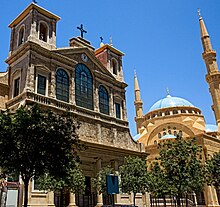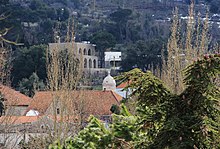
Back الدين في لبنان Arabic লেবাননে ধর্ম Bengali/Bangla Crefydd yn Libanus Welsh Θρησκεία στο Λίβανο Greek Religión en Líbano Spanish Religion au Liban French लेबनान में धर्म Hindi Agama di Lebanon ID Religioni in Libano Italian რელიგია ლიბანში Georgian



Lebanon is an eastern Mediterranean country that has the most religiously diverse society within the Middle East, recognizing 18 religious sects.[2][3] The recognized religions are Islam (Sunni, Shia, Alawites, Isma'ili and Druze), Christianity (the Maronite Church, the Greek Orthodox Church, the Melkite Greek Catholic Church, evangelical Protestantism, the Armenian Apostolic Church, the Armenian Catholic Church, the Latin Church, the Syriac Catholic Church, the Syriac Orthodox Church, the Assyrian Church of the East, the Chaldean Catholic Church, the Coptic Orthodox Church) and Judaism.
Lebanon differs from other Middle East countries where Muslims have become the majority after the civil war, and somewhat resembles Bosnia-Herzegovina and Albania, both are in Southeast Europe, and have a diverse mix of Muslims and Christians that each make up a large proportion of the country's population. Christians were once a majority inside Lebanon and are still an overwhelming majority in the diaspora, which consists of nearly 14 million people.[5][6]
Besides Lebanese citizens in Lebanon, a large proportion of people in the country are refugees, accounting for approximately 2 million people out of a bit over 6 million in 2017, which affects statistics.[2] The refugees, who mostly are of Syrian or Palestinian origin, are predominantly Sunni Muslim, but include Christians and Shia Muslims.[2]
Under the National Pact, the president of Lebanon must be a Maronite Christian,[7] the prime minister a Sunni Muslim,[8] and the speaker of parliament a Shia Muslim.[9]
- ^ Hobby (1985). Near East/South Asia Report. Foreign Broadcast Information Service. p. 53.
the Druzes and the Christians in the Shuf Mountains in the past lived in complete harmony..
- ^ a b c "International Religious Freedom Report for 2017". www.state.gov. United States Department of State. Retrieved 30 March 2019. Cites Statistics Lebanon for most Lebanon statistics
- ^ Alfred B. Prados (June 8, 2006). "CRS Issue Brief for Congress: Lebanon". The Library of Congress. Retrieved June 11, 2012.
- ^ International Foundation for Electoral Systems (September 2011). "Overview of the current 26 electoral districts" (PDF).
- ^ Kechichian, Joseph A. (17 November 2015). "Lebanon contemplates a new citizenship law". gulfnews.com. Retrieved 17 April 2018.
- ^ "Bassil promises to ease citizenship for expatriates". The Daily Star. 1 May 2014. Archived from the original on 2 May 2014. Retrieved 17 April 2018.
- ^ Gambill, Gary C. (January 2001). "Michel Aoun Former Lebanese Prime Minister". Middle East Intelligence Bulletin. Archived from the original on 4 April 2011. Retrieved 8 September 2024.
- ^ William Harris (2012). Lebanon: A History, 600-2011. Oxford University Press. p. 347. ISBN 978-0-19-518111-1.
- ^ "Nabih Berri, born 1938". Wars of Lebanon. Retrieved 8 September 2024.